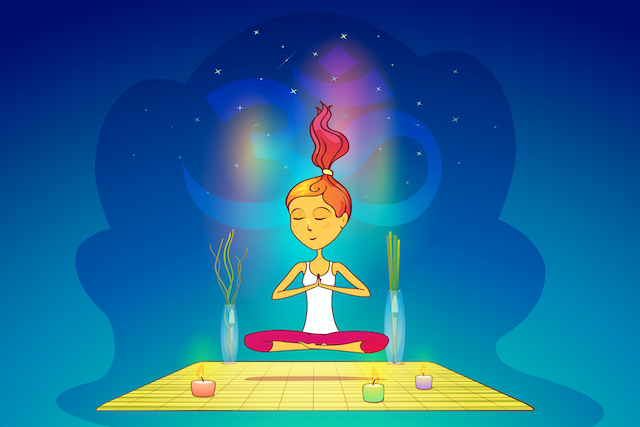
“Happiness is not a matter of intensity, but of balance, order, rhythm, and harmony.” ~Thomas Merton
I’m not someone who enjoys busyness or sees it as a sign of importance. In fact, I’ve often sacrificed money and opportunities to have more time to watch movies, roam around my neighborhood, and generally live life at a slow pace.
This is the way I most enjoy experiencing my days—by creating space to just be. And I find this supports my passion as a writer, since it allows me abundant opportunities to play, explore, and expand my understanding of the world and my place within it.
But I’ve also noticed that I formerly limited myself in response to underlying fears and limiting beliefs, and then justified it with my fondness for free time.
Whenever I received an opportunity to do something that would stretch my comfort zone, I reminded myself how hectic my schedule would be if I said yes.
Whenever I considered doing something new that I feared might fail (or might succeed, giving me more responsibility), I reminded myself that I was already meeting my needs, so it would probably be best to just keep doing what I was doing.
Essentially, I allowed myself to believe I had only one healthy motivation for not growing in new directions; and while this did support my priorities and preferences, it also created a sense of stagnation.
So this year I decided to challenge those limiting beliefs and fears. I started redefining myself beyond the safe roles of writer and free spirit, and recognized that I could actually be happier for trying new things and taking more risks.
While I know the choice was ultimately positive for me, I’ve struggled a little in the execution.
I’ve overwhelmed my schedule with projects—including the recent redesign/forum launch, a new book on self-love, and my first ever eCourse.
I’ve tried to do more on my own than I feasibly can—from reading and editing an ever-growing number of monthly blog submissions, to mentoring new writers, to handling all aspects of the site’s daily operations, to maintaining a freelance job writing for ‘tween girls.
And in the process, I’ve sacrificed some of my needs and priorities, including exercise and relaxation.
I’ve swung the pendulum from calm to chaos, and I’ve left myself little time and space to discover the middle ground between holding myself back and pushing myself.
I’m now in the process of adjusting to this decision to do new things, and I’ve realized it requires four conscious choices:
- Recognizing my non-negotiable needs and prioritizing them
- Setting realistic expectations about what I can do and what I can’t
- Regularly checking in with myself to ensure my choices support my intentions
- Learning from my emotions instead of reacting to them
If you’re also adjusting to a busier lifestyle—whether you’re working toward a dream or taking on new responsibilities at work or at home—these tips may help:
1. Recognize your non-negotiable needs.
Write down the top two or three things you need to do daily for your emotional well-being, your physical health, and your sense of balance. Include the bare minimum you could do to meet these, and ideal times. For me, that includes:
Emotional well-being
- Daily meditation and/or deep breathing (five minutes after waking up)
- Journaling (five minutes before going to sleep)
Physical health
- Daily exercise, even if just a walk outside (ten minutes around lunch time)
- Consistent sleep (eight hours—doable if I’m more efficient instead of wasting time online)
Sense of balance
- Time to relax and unwind (a half-hour bath at night)
- Time to play (a half-hour of something fun at night, preferably with someone else)
You’ve now established the bare minimum for your needs and created a plan to meet them. Even meeting the minimum might be hard. It might require you to ask for help or say no to certain requests. Think of it as saying yes to your happiness.
2. Set realistic expectations about what you can and can’t do.
I have a habit of making a schedule based on what I want to accomplish and then feeling disappointed in myself if I don’t meet that.
My schedule doesn’t often leave room for the unexpected, which could encompass tasks taking longer than I anticipated they would, or new opportunities coming up, personally or professionally.
If you’re striving to meet your boss’s expectations, you may have less leeway in being flexible. But when it comes to the arbitrary deadlines we set for ourselves, we have the power to release the pressure.
I often worry that deviations from my plan mean I’m losing control and decreasing the odds of doing what I set out to do. This actually sets me up for failure.
When I worry about what I’m not doing, I’m not focused on what I am. And that’s what’s enabled me to do things well in the past: not perfect adherence to a schedule, but focus and immersion in the process.
A better approach is to set a plan, do what we can, and then adjust as we go. Whatever we can’t comfortably fit in a day will just have to wait.
3. Regularly check in with yourself to ensure your choices are supporting your intentions.
I’ve found some contradictions in my recent mode of operating, including:
- I try to do everything myself because this site means so much to me, and I fear delegating responsibility to someone who may not care quite as much. The consequence: I’m sometimes stretched too thin to give everything the care it deserves.
- I’m taking on new projects because I know I’ll be happier for stretching myself, but I’ve deprioritized a lot of the other things that make me happy.
In recognizing these contradictions, I’m able to adjust accordingly.
I can challenge the belief that tells me I need to do everything myself, and seek help (which I’ve recently done). I can create a better balance between working toward future joy and creating joy in the process.
Take the time to check in what you really want—not just some day down the road, but in your everyday experience in the world. If you recognize you’re not enabling that, make tiny adjustments where you can.
4. Learn from your emotions instead of reacting to them.
When we’re doing something new, our emotions run the full gamut, from excitement to fear, eagerness to anxiety, and countless shades in between.
Some of these feelings are natural consequences of stretching our comfort zone, but other times they’re indicators about what’s not working and what we need to change.
I’ve learned to stop whenever I’m feeling something overwhelming and ask myself these four questions:
- What led up to this?
- Is this feeling a response to ignoring a need, pushing myself too hard, expecting too much of myself, or somehow treating myself without kindness and compassion?
- Is this a feeling I could release by coming back to the present moment (like worry about the future) or is it something with a lesson for me (like feeling overwhelmed because I need help, or anxious because I need a break)?
- If there’s a lesson, what can I do or change to apply it?
When we learn from our emotions, they become less overpowering and we become more present, more balanced, and more effective.
—
A while back, I wondered if the days of leisurely strolls were over, now that I’ve chosen to do a lot more. Then I realized that’s up to me. There is a grey area between underachieving and overachieving where growth and presence are both possible.
Finding that space is about making conscious choices. I know what those are for me. What are the choices that help you?
About Lori Deschene
Lori Deschene is the founder of Tiny Buddha. She started the site after struggling with depression, bulimia, c-PTSD, and toxic shame so she could recycle her former pain into something useful and inspire others to do the same. You can find her books, including Tiny Buddha’s Gratitude Journal and Tiny Buddha’s Worry Journal, here and learn more about her eCourse, Recreate Your Life Story, if you’re ready to transform your life and become the person you want to be.
- Web |
- More Posts













 Though I run this site, it is not mine. It's ours. It's not about me. It's about us. Your stories and your wisdom are just as meaningful as mine.
Though I run this site, it is not mine. It's ours. It's not about me. It's about us. Your stories and your wisdom are just as meaningful as mine.
Great article, Lori. You already know how I handle expectations, but the idea of learning instead of responding to our emotions is interesting. I think of my biggest issue when I was younger was the fact that I was very responsive. I let it get to me and I showed it in my face, my words, everything. It’s pretty different now though and I handle emotions similar to you. Looking at our emotions objectively helps to avoid reacting in the future and lets you be more “zen.”
I was the same Vincent, and it’s something I still need to work at. I often want to “do something” with my emotions instead of learning from my emotions what I really need to do. Observing them objectively, though hard, helps a great deal!
A phrase from yoga helps me: FInding the spot between effort and ease.
That’s definitely the place to be!
Lori – This article is spot on for me, I’ve felt so stagnant in my life as of late. I got stuck like you did after trying to take on too much and then I was overwhelmed and lost the drive and interest in the things I was pushing myself to do. After 5 months now I feel like I’m back to where I started and reassessing the correct way to approach my life.
I found myself getting anxious and depressed about the past and future because I’m too focused on the people around me making moves. I need to slow down and breathe and continue to remind myself that we all move at our own pace and there are no expectations of me in this life.
I know what you mean Phil. I make comparisons at times as well. It’s so tempting to see what other people are doing and then measure our growth and success based on that. Like you, I’m far less anxious when I focus on the moment and take the pressure off myself to somehow “catch up” to others!
I got tired just reading what you do with your days Lori – you sound like a super woman to me!
You are so right though we have to take the time to reflect and listen to our inner self, stop get off the merry go round and just listen. It is only then that we are able to follow what our spiritual side is telling us. Life is about balance as your article well depicts.
I sometimes like to *think* I’m superwoman–that’s usually when I feel incredibly overwhelmed! When I listen to my needs and instincts my life is far more balanced, because I’m happiest that way.
Great post, Lori! I read recently that emotions only last 1.5 minutes – after that we have to reactivate them to keep them going. So like you say, if we can sit with the feelings vs. reacting to them, those deeper answers usually arrive on their own, if we can wait it out.
I’ve never heard that before, but how interesting. I know there have been times when I’ve stewed in my emotions for far longer than a minute in a half. Really puts into perspective just how strong our resistance can be–and how helpful it can be to stop and breathe when we first feel something overwhelming.
Thanks, Lori. I often shy away from challenges or exciting new opportunities, and also justify it by saying I’m protecting myself from compromising my current lifestyle. Upon honestly examining that tendency, however, I can see its undercurrent is fear of failure and change. I like the idea of scheduling non-negotiable minimum needs, and, to be honest, even in my supposedly low-time-pressure day, I often don’t meet those, not because of time constraints, but because I waste time living anywhere but in the present moment. So, thank you for the applicable and timely post!
You’re most welcome! I know all about living outside the present moment. Even when I work at it regularly, I still drift to the past and the future at times. I’m glad you found this helpful. =)
Thank you for this post. I am in the process of re-making my life, including launching a health & wellness/life balance coaching practice, and these are HUGE lessons for me to keep in mind for not just my clients, but for me as well as I continue on this journey. THANK YOU!
You’re most welcome Jill! Congrats on your coaching practice. =)
Fantastic Lori! Thank you 🙂 xo
“There is a grey area between underachieving and overachieving where growth and presence are both possible.”
LIKE THIS! =)
Thanks Taylor–I’m glad you enjoyed the post! =)
Thank you for sharing such great wisdom with us 🙂
Learning from emotions is so incredibly difficult. How difficult is it to get rid of a jealous feeling, or annoyed feeling, or frustrated feeling when we experience those?!
A definition of emotion I find helpful I have put here:
“Emotions are feelings: negative emotions like sadness and fear cause suffering; positive emotions like happiness and gratitude cause joy. They appear when you are aware of yourself in relation to your surroundings. They change according to changes in that relationship and your intention.”
http://secrettruthoflife.com/2013/08/10/what-is-emotion/
Asking ourselves questions is helpful to learn from and is a natural first step. But what then?
We have cleaned them out, but the roots are still there, we want to clean out the roots so they never haunt us again 🙂 Cause and effect. Good cause, good effect.
Where does suffering come from? Our blindness.
(You can read more on this link too 🙂 )
http://secrettruthoflife.com/2013/08/03/suffering/
So if learning from emotions is one key to development, then observing using eternal wisdom is the lock and the discipline to practice and develop until perfect and pure is the door to living every second in amazing joy and wonder for life. Does that metaphor work? I just thought of that 🙂
Then with such amazing wisdom from every angle to share in our lives we can create and live in the 4 Eternal Hearts – causing more spiritual karma to share with every life:
Kindness without ego,
Care without over emotion,
Joy without stupidity
Freedom without greed.
Great to develop wisdom with you and hope to share more in future 🙂
I’ve noticed myself implementing many of these techniques into my own life, lately. My happiness has increased because I’ve begun to learn how to enjoy being content. Contentment is a very underrated emotion. It provides for a safe mental environment in which we can look further inward. With this pondering we can better adapt to life! Thanks for sharing these ideas ツ
You’re most welcome. I think contentment is underrated. I know for me, I spent a lot of time wondering how I could be happier when really, I could have been far happier by simply appreciating the way things were.